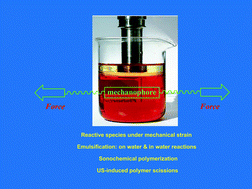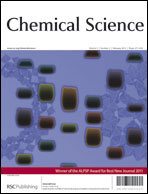Harnessing mechanochemical effects with ultrasound-induced reactions
Abstract
Chemical reactions may experience numerous and varied effects under the influence of ultrasound. This soft radiation, often viewed as a lab trick, induces and improves both physical and chemical transformations by means of efficient agitation, dissolution, mass and heat transfers, and reagents sonolysis, which all arise from the cavitational collapse. An empirical rationale that distinguishes between true chemical effects and mechanical ones, especially in heterogeneous reactions, was introduced more than two decades ago and has been a useful guidance on reporting sonochemical mechanisms. Recent studies have witnessed a truly remarkable data set that boosts sonochemistry over the wall of applied science. This perspective highlights the importance of the so-called false sonochemistry-closely related to mechanochemistry-in modern synthesis, thus illustrating the advantages of using pressure waves in chemistry. Emphasis is put on green transformations, mild


 Please wait while we load your content...
Please wait while we load your content...